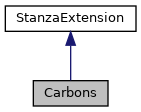#include <carbons.h>

Public Types | |
| enum | Type { Received , Sent , Enable , Disable , Private , Invalid } |
Public Member Functions | |
| Carbons (Type type) | |
| Carbons (const Tag *tag=0) | |
| virtual | ~Carbons () |
| Type | type () const |
| virtual Stanza * | embeddedStanza () const |
| virtual Tag * | embeddedTag () const |
| virtual const std::string & | filterString () const |
| virtual StanzaExtension * | newInstance (const Tag *tag) const |
| virtual Tag * | tag () const |
| virtual StanzaExtension * | clone () const |
 Public Member Functions inherited from StanzaExtension Public Member Functions inherited from StanzaExtension | |
| StanzaExtension (int type) | |
| virtual | ~StanzaExtension () |
| int | extensionType () const |
Detailed Description
An implementation of Message Carbons (XEP-0280) as a StanzaExtension.
Enable Mesage Carbons
Before using Message Carbons you have to check your server for support of the extension. You can do so using Disco::getDiscoInfo(). You can check the result (in DiscoHandler::handleDiscoInfo()) for a feature of XMLNS_MESSAGE_CARBONS (use Disco::Info::hasFeature()).
If the feature exists, you can enable Message Carbons with the server.
- Note
- Once enabled, the server will automatically send all received and sent messages of type
Chatto all other Carbons-enabled resources of the current account. You have to make sure that you actually send messages of typeChat. The default is currentlyNormal.
Disable Message Carbons
Once enabled, you can easily disable Message carbons. The code is almost identical to the code used to enable the feature, except that you use a Carbons::Type of Carbons::Disable when you add the Carbons extension to the IQ:
Prevent carbon copies for a single message
To disable carbon copies for a single message, add a Carbons extension of type Private:
The server will not copy this message to your other connected resources.
Access received carbon copies
When receiving a message (sent by either another connected client of the current user, or by a 3rd party), a carbon copy will have the following characteristics:
- The message's
fromattribute will be the bare JID of the receiving entity. - The message's
fromattribute will be the full JID of the receiving entity. - The message contains a Carbons StanzaExtension. This extension contains the original message with the original
from/toattributes.
Some sample code:
You can also determine whether a carbon was sent by a 3rd party or a different client of the current user by checking the return value of Carbons::type().
XEP Version: 0.8
- Since
- 1.0.5
Member Enumeration Documentation
◆ Type
| enum Type |
The types of Message Carbons stanza extensions.
Constructor & Destructor Documentation
◆ Carbons() [1/2]
| Carbons | ( | Carbons::Type | type | ) |
Constructs a new Carbons instance of the given type. You should only use the Enable, Disable and Private types.
- Parameters
-
type The Carbons type to create.
Definition at line 30 of file carbons.cpp.
◆ Carbons() [2/2]
Constructs a new Carbons instance from the given tag.
Definition at line 35 of file carbons.cpp.
◆ ~Carbons()
|
virtual |
Virtual destructor.
Definition at line 59 of file carbons.cpp.
Member Function Documentation
◆ clone()
|
virtual |
Returns an identical copy of the current StanzaExtension.
- Returns
- An identical copy of the current StanzaExtension.
Implements StanzaExtension.
Definition at line 98 of file carbons.cpp.
◆ embeddedStanza()
|
virtual |
This function returns the embedded Stanza, if any. You only have to reimplement it if your protocol flow contains embedded Stanzas.
- Returns
- The embedded Stanza. May be 0.
Reimplemented from StanzaExtension.
Definition at line 70 of file carbons.cpp.
◆ embeddedTag()
|
virtual |
This function returns the embedded Tag that the embedded Stanza is based on, if any. You only have to reimplement it if your protocol flow contains embedded Stanzas.
- Returns
- The embedded Tag. May be 0.
Reimplemented from StanzaExtension.
Definition at line 78 of file carbons.cpp.
◆ filterString()
|
virtual |
Returns an XPath expression that describes a path to child elements of a stanza that an extension handles.
- Returns
- The extension's filter string.
Implements StanzaExtension.
Definition at line 64 of file carbons.cpp.
◆ newInstance()
|
inlinevirtual |
Returns a new Instance of the derived type. Usually, for a derived class FooExtension, the implementation of this function looks like:
- Returns
- The derived extension's new instance.
Implements StanzaExtension.
◆ tag()
|
virtual |
Returns a Tag representation of the extension.
- Returns
- A Tag representation of the extension.
Implements StanzaExtension.
Definition at line 86 of file carbons.cpp.
◆ type()
|
inline |
The documentation for this class was generated from the following files: